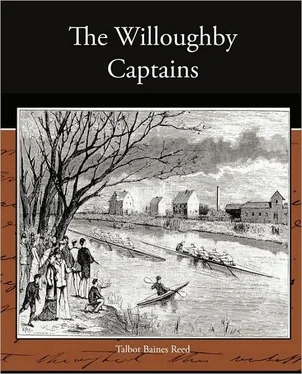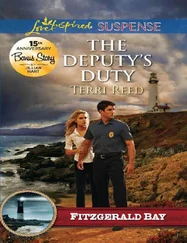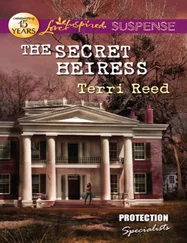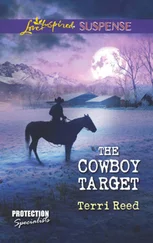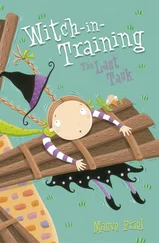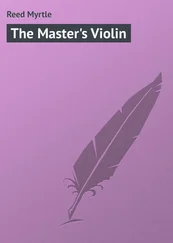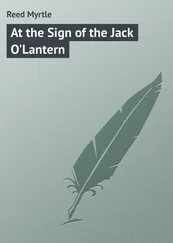Game sat down amidst a tempest of applause, which brought a flush of pleasure even to his serious face.
Many curious eyes were turned to Riddell to see the effect of this uncomplimentary oration upon him.
At first he had looked nervous and uncomfortable, and had even whispered to Fairbairn, who sat next him, “Don’t you think I’d better go?”
“For goodness’ sake, no!” exclaimed Fairbairn. “Don’t be a fool, Riddell.”
The caution had its weight. Riddell saw he must brave it out; and that being settled, he felt more comfortable, and listened to all the unpleasant things that were said in a composed manner which greatly perplexed his adversaries.
Ashley, who seconded Game’s motion, was hardly so fortunate in his remarks as his predecessor.
“I second the motion, gentlemen,” he said. “It’s time we made a stand against this sort of thing.” (“What sort of thing?” from voices on the schoolhouse side.) “Why, schoolhouse tyranny. (Frantic Parrett cheers.) Why is the whole credit of Willoughby to be sacrificed for the sake of your precious schoolhouse?” (“Question!” “Order!” drowned by renewed cheers.) “Why, just because he’s a schoolhouse fellow, is a muff to be stuck over us? and just because he’s a Parrett’s fellow, is a splendid fellow like Mr Bloomfield to be snubbed in the face of the whole school? (Loud cheers.) It’s time Willoughby found out that Parrett is the cock house of the school.” (“Oh! oh!” from the Welchers.) “It’s got the best men in it. (Parrett cheers.) It’s head of the river.” (“Oh no, not yet,” from Fairbairn.) “Well, it will be very soon. It’s ahead in everything.” (“Except intelligence,” from Crossfield.) “No, I don’t even except intelligence. (Loud cheers from Bosher, and laughter.) And, as a sign of its intelligence, I beg to second the motion.”
This abrupt and somewhat vague termination to Ashley’s spirited address did not detract from the applause with which it was greeted by his own partisans, or from the wrath with which it was received by the schoolhouse boys.
The moment he sat down Crossfield sprang to his feet. This was the signal for loud schoolhouse cheers, and for general attention from all quarters, for Crossfield usually had something to say worth listening to.
“Mr Limpet, sir,”—(loud laughter; Isaacs, who had been drawing niggers on the paper before him, started, and blushed very much to find himself thus appealed to)—“I am sure we are all much obliged to the honourable member who has just sat down for the ‘sign of intelligence’ he has just favoured us with. (Laughter.) We’ve been looking for it for a long time — (laughter) — and it’s come at last! (Cheers and laughter.) Sir, it would be a great pity to let such an occasion pass without notice. I’m not sure that the doctor might not think it worth a half-holiday. A sign of intelligence from the hon. gentleman! And what is the sign, sir? (Laughter.) The hon. member seconds the motion.” (“Hear, hear!” from Parrett’s.) “Gentlemen of the same party say ‘Hear, hear!’ as much as to say, ‘We, too, show signs of intelligence!’ Do you really, gentlemen? I could not have believed it. (Loud laughter.) Why does he second the motion? Because he’s a Parrett’s boy, and Mr Bloomfield is a Parrett’s boy, and all Parrett’s boys say a Parrett’s boy ought to be the head of the school! Gentlemen, parrots aren’t always to be trusted, even when they show signs of intelligence! (Cheers and laughter.) Don’t you believe all a parrot tells you about parrots. (Laughter.) I prefer the arguments of the gentleman who moved the amendment. He says he doesn’t think Mr Riddell is fit to be captain. (Cheers.) I agree with him — (tremendous Parrett’s cheers, and consternation of schoolhouse) — I don’t think Mr Riddell is fit to be captain. He doesn’t think so himself.” (“Hear, hear!” from Riddell, and laughter.) “But the gentleman says Mr Bloomfield is the man. (Loud cheers.) I don’t agree with that at all. Mr Riddell knows very little about sports, though I do hear he was seen coxing a schoolhouse boat this morning. (Derisive cheers.) Mr Bloomfield knows almost as little about classics! (Loud laughter from the schoolhouse.) Why, gentlemen, do you mean to say you think a fellow who couldn’t translate ‘Balbus hopped over a wall’ without looking up three words in a lexicon is fit to be a Willoughby captain?” (Laughter from the juniors, and cries of “Time!” from Parretts.) “I say not. Even though he’s a Parrett’s boy, and therefore can show a sign of intelligence! (Laughter.) No; what I say is, whether we believe in him or not, Mr Riddell is captain; and until you can show me a less bad one, I’ll vote for him.”
This oration, delivered with great animation and amidst constant laughter, helped to put the meeting in rather better humour, all except the Parrett’s fellows, who did not enjoy it at all.
However, before any of them could make up his mind to reply, a shrill voice was heard from the other end of the hall, “Sir! It is time the Welchers had a word!”
This innocent announcement caused a loud burst of laughter, in which every one joined, especially when it was discovered that the orator was none other than the youthful Mr Pilbury himself!
He stood surrounded by a small cluster of admiring juniors, who glared defiantly out on the assembly generally, and “backed up their man” till he could hardly breathe.
“It’s all very well,” screamed Pilbury. (Loud cheers from Cusack and Philpot.) But here the chairman’s hammer sounded and cries of “Order” checked the orator’s progress.
“The hon. member,” said Isaacs, “cannot propose his motion till the motion before the House is disposed of.”
Pilbury scowled fiercely at the speaker.
“I shall propose it,” he cried, “and you’d better shut up, old Ikey!”
Game, amid much laughter, rose to order, and asked if these expressions were parliamentary?
Isaacs said, “Certainly not, and Mr Pilbury must withdraw them.”
Mr Pilbury said “he’d withdraw his grandmother,” and attempted to continue his speech, when Fairbairn rose and suggested to the hon. member that if he would only wait a bit the House would be delighted to hear him. After this conciliatory advice Pilbury let himself be pulled down into his seat by his admirers, and the debate on Game’s amendment continued.
It was hot and exciting. The arguments were mostly on the side of the schoolhouse, and the vehemence on the side of Parrett’s. Once or twice a Welcher dropped in a speech, attacking both parties and once or twice a schoolhouse boy spoke in favour of Bloomfield, or a Parrett’s boy spoke in favour of Riddell. At last, after about an hour’s angry debate, the House divided. That is, all those in favour of Game’s amendment moved over to one side of the room, and those against it to the other, and those who did not want to vote at all kept their seats in the middle.
There was no need to count the numbers of the rival parties as they stood. Only about twenty-five stood beside Fairbairn and the schoolhouse, while nearly two hundred and fifty boys crowded the side of the room along which Game and his followers took their stand. The triumph of the opponents to the new captain was complete, and the school had given him and the head master a most emphatic reply to the late appointment.
Riddell would have much preferred to be allowed to withdraw of his own accord rather than remain to be beaten. But his friends had all opposed the idea as cowardly, and he had given in to them. He now took his defeat very placidly, and even joined in the laughter which greeted Mr Isaac’s call.
“Now, Mr Pilbury!”
Mr Pilbury was “off his speech.” If he had been allowed to proceed when he first rose, he had the steam up and could have let out, as he told his friends; but now the spirit had been taken out of him. However, he was compelled to make an effort, and began as before, “Sir, it is time the Welchers had a word.”
Читать дальше
